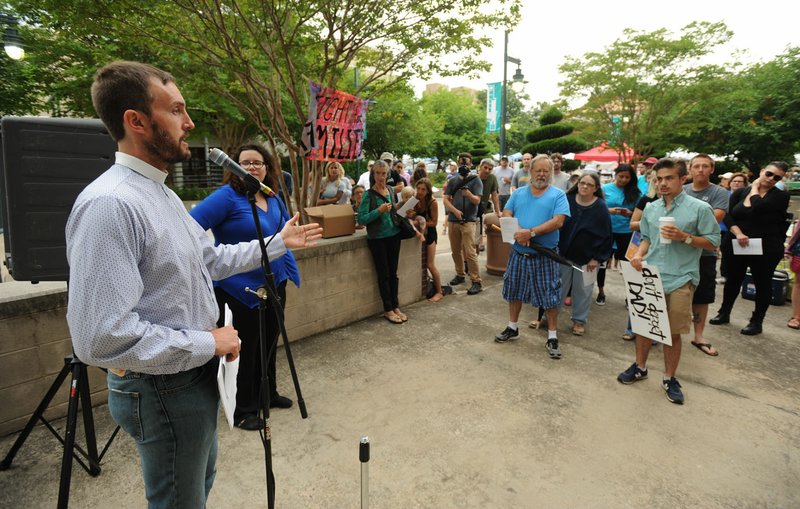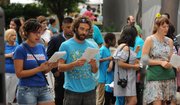FAYETTEVILLE -- A move by cities in Northwest Arkansas to declare themselves "welcoming cities" has drawn praise and condemnation by groups that believe such a declaration takes a stance on illegal aliens.
The Welcoming Community initiative does not require, or even ask, a town to address immigration law, said supporters and spokesmen for two participating cities, Fayetteville and Springdale. Spokesmen for both cities said they received explicit assurances that participation would not step on a slippery slope to "sanctuary city" status.
Fayetteville's and Springdale's participation is being cited by a pro-immigrant group as a reason the Washington County sheriff's office should drop a longstanding policy. The sheriff's office holds jailed people who are not in the country legally for federal immigration authorities.
Welcoming Community organizers and participants said both sides are wrong.
The nonprofit EngageNWA, a Northwest Arkansas partnership that aims at improving the region's quality of life, promotes the program.
Welcoming Community's goals are cultural and social, not legal, said Terry Bankston, EngageNWA director. The initiative is as much about Northwest Arkansas imparting its culture to new residents as it is about enriching the culture with contributions from new arrivals, he said.
"I moved here from Ohio. There are things a community can do to make people feel more welcome when they move here" from anywhere, Bankston said.
Welcoming Communities are cities, counties and nonprofit groups that voluntarily abide by a set of guidelines set up by an umbrella group called Welcoming America. The guidelines include actions that make it easier to navigate city services, such as getting around city websites or knowing what city codes are.
The Welcoming America website says the organization "leads a movement of inclusive communities becoming more prosperous by making everyone feel like they belong. We believe that all people, including immigrants, should be valued contributors and are vital to the success of both our communities and our shared future."
The website also asks members to support cultural and social events where everyone would feel welcome.
"If you sit down and read what they ask you to do, a lot of it was things we're doing already," said Springdale Mayor Doug Sprouse.
Springdale found the suggestions useful because "over one-third of the people living in the city are not from around here," Sprouse said. "I wasn't going to do anything that would have this city going down the path of becoming a sanctuary city or anything like that."
The term "sanctuary city" is not legally defined, but it generally refers to jurisdictions that don't cooperate with U.S. Immigration and Customs Enforcement, according to The Associated Press. San Antonio, Dallas and Austin, Texas, are in court seeking to overturn laws passed by the Texas Legislature to discourage such cities. President Donald Trump has threatened federal action against sanctuary cities, such as withdrawing federal funds.
"Nothing I signed says anything about that, and I asked about it, too," Sprouse said. He received assurances from both EngageNWA and Welcoming America, he said.
Fayetteville has the same understanding as Sprouse from EngageNWA and Welcome America representatives, city spokesman Susan Norton said.
Yet Northwest Arkansas attorney Stephen Coger -- a co-organizer of a "Don't Deport Dad" rally, news conference and gospel music show Saturday in Fayetteville -- cited the cities' participation as a sign they don't support enforcement of immigration laws.
The Arkansas Justice Collective -- a nonprofit group that advocates for immigrants, low-income people and minority groups -- organized the event, which was attended by about 75 people. Also cooperating in the rally was Ozarks Indivisible, a group that opposes many of Trump's policies, including those on immigration.
The rally protested the practice of the Washington County sheriff's office, under Sheriff Tim Helder, of notifying Immigration and Customs Enforcement when a person in the country illegally is taken into custody, whatever the charge.
"Anyone who visits the Washington County Jail and is an immigrant or a refugee is endangered by the ICE detainer programs," Coger said in a statement issued before the rally. "Sheriff Helder will hold folks on ICE detainers if they are detained on any charge."
"Fayetteville and Springdale have declared themselves Welcoming Communities, and yet Tim is not on board," the statement continued.
The group wants Helder to only hold an illegal alien if the federal agency has an outstanding warrant for his arrest on immigration charges.
The statement cited court rulings in Texas, including one in a case earlier this month in which authorities held a prisoner for the federal agency after the charges for which he was arrested were dropped.
U.S. District Judge Orlando Garcia in San Antonio ruled that the continued detention of the man was unconstitutional, amounting to being arrested without a warrant.
Coger said he believes city councils and county quorum courts should speak up against such actions.
Helder disagreed.
"What they want is for me to turn the blind eye to a law on the books," the sheriff said. "That makes no sense to any law enforcement officer, and I've been one for 38 years. I have an obligation."
Helder and Coger said they weren't aware of any similar ruling from a court with jurisdiction in Arkansas.
"They have to be in the jail before we even begin to determine their immigration status, so they are there for a felony or misdemeanor already," Helder said.
Metro on 06/18/2017


